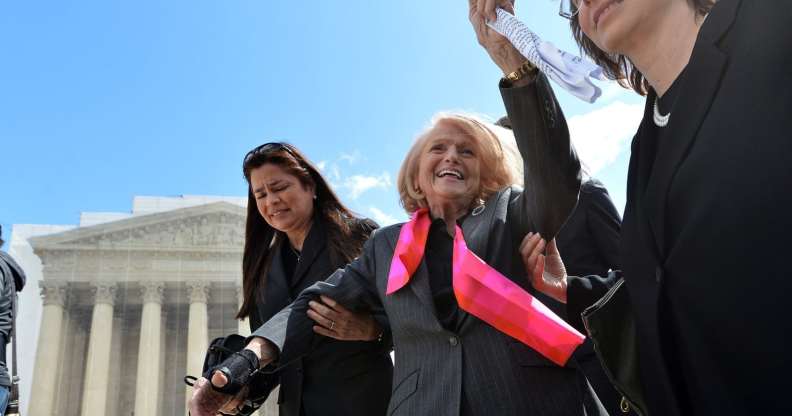Equal marriage hero Edie Windsor would ‘expect us all to fight’ after conservative Supreme Court judges’ attack, says her widow

Plaintiff of the US v Windsor case challenging the constitutionality of Section 3 of the Defense of Marriage Act (DOMA), Edie Windsor. (JEWEL SAMAD/AFP/Getty)
Edie Windsor, the late equal marriage hero, would be ready to fight after the recent attack on the 2015 same-sex marriage ruling by Supreme Court justices Clarence Thomas and Samuel Alito, says her widow.
Windsor was the plaintiff in the 2013 US Supreme Court case that struck down the Defense of Marriage Act (DOMA), the federal law that banned recognition of same-sex marriage.
With the support of the Obama administration the court struck down the homophobic law, setting a precedent which would lead it to bring marriage equality to all 50 states just two years later.
She died aged 88 in September 2017, but not before she was able to reap the rewards of her tireless fight for marriage equality. She met Judith Kasen-Windsor at an LGBT+ rights event in 2015, and the couple moved in together in Manhattan, marrying in 2016 following legalisation in all 50 states.
Speaking to Advocate, Kasen-Windsor said: “She celebrated the day the verdict came down, and she went to Stonewall.
“She was just so full of hope. And when gay marriage was finally decided two years later, she felt like her fight had been won.”
But this week, Supreme Court justices Clarence Thomas and Samuel Alito launched an extraordinary attack on the ruling that led to equal marriage, claiming that people who discriminate against gay couples are “victims” of the law, and showing that the fight has not really been won.
Kasen-Windsor said: “One of the best articles ever written about Edie was Ariel Levy’s piece in The New Yorker, called ‘The Perfect Wife’, and the it begins with a quote from Edie: ‘F**k the Supreme Court.’
“So that should give you a good idea about how Edie would feel about what’s going on right now.”
Kasen-Windsor recalled how when Donald Trump was elected in 2016, her wife somehow remained optimistic, and didn’t believe conservatives would do anything more than “chip away” at civil rights laws on marriage equality and abortion rights.
But throughout the first year of Trump’s presidency, Windsor began getting “more worried and upset”.
“I can’t even imagine what she’d be like right now after hearing the news this week,” said Kasen-Windsor. “But I do know one thing, she’d be right in there to start to fight, and that’s what she would expect all of us to do right now.
“This is no time to take our rights for granted, and no time to remain silent. She would be speaking up as loud as she could.”
Supreme Court judges Thomas and Alito were among the dissenters against marriage equality when the court split five to four on the issue in 2015.
On Monday (October 5) they launched a surprise attack on the ruling, writing in a statement: “It would be one thing if recognition for same-sex marriage had been debated and adopted through the democratic process, with the people deciding not to provide statutory protections for religious liberty under state law.
“But it is quite another when the court forces that choice upon society through its creation of atextual constitutional rights and its ungenerous interpretation of the free exercise clause, leaving those with religious objections in the lurch.”
“This petition provides a stark reminder of the consequences of [Obergefell v. Hodges],” they continued. “By choosing to privilege a novel constitutional right over the religious liberty interests explicitly protected in the First Amendment, and by doing so undemocratically, the court has created a problem that only it can fix.
“Until then, Obergefell will continue to have ruinous consequences for religious liberty.”

